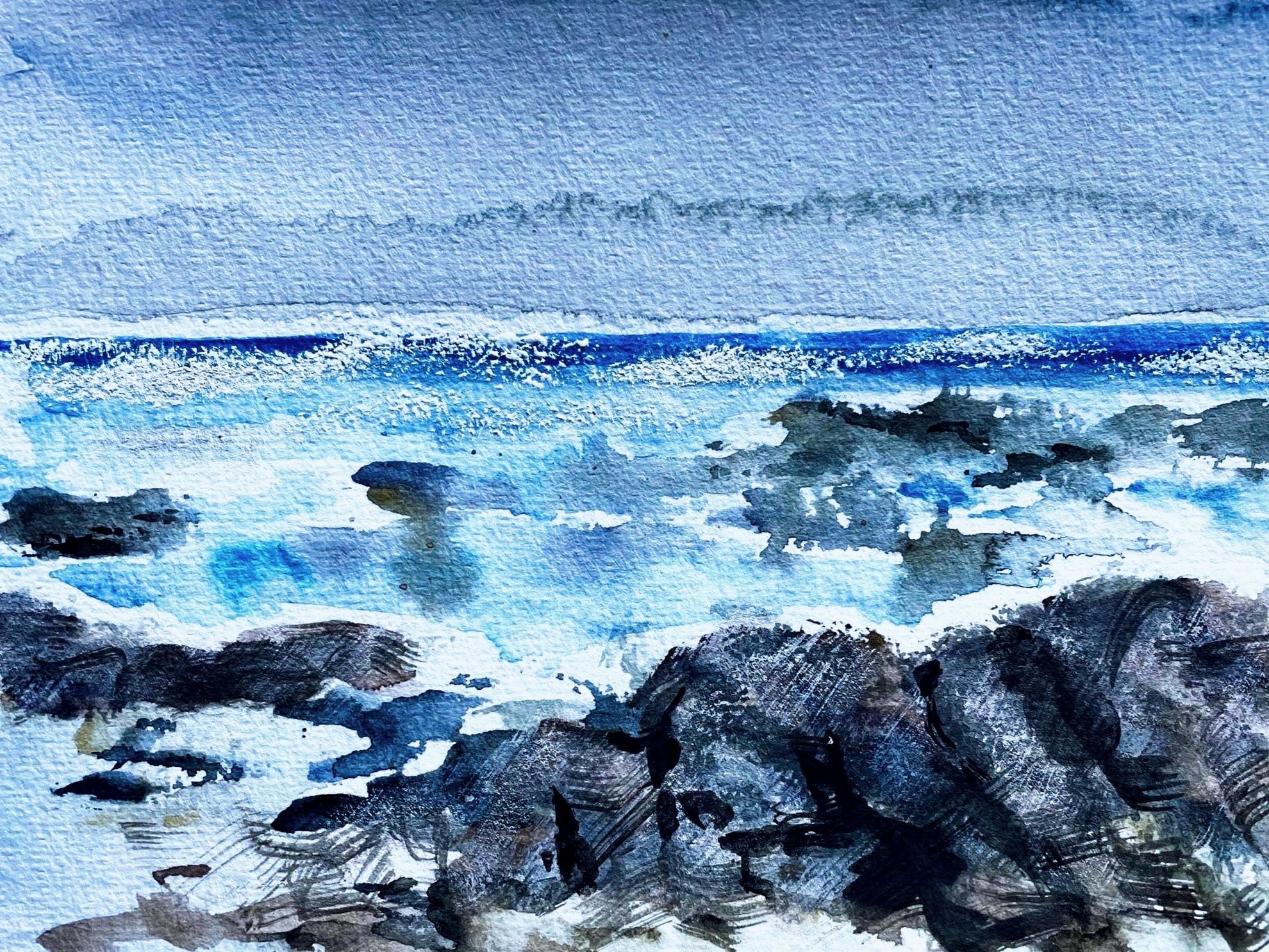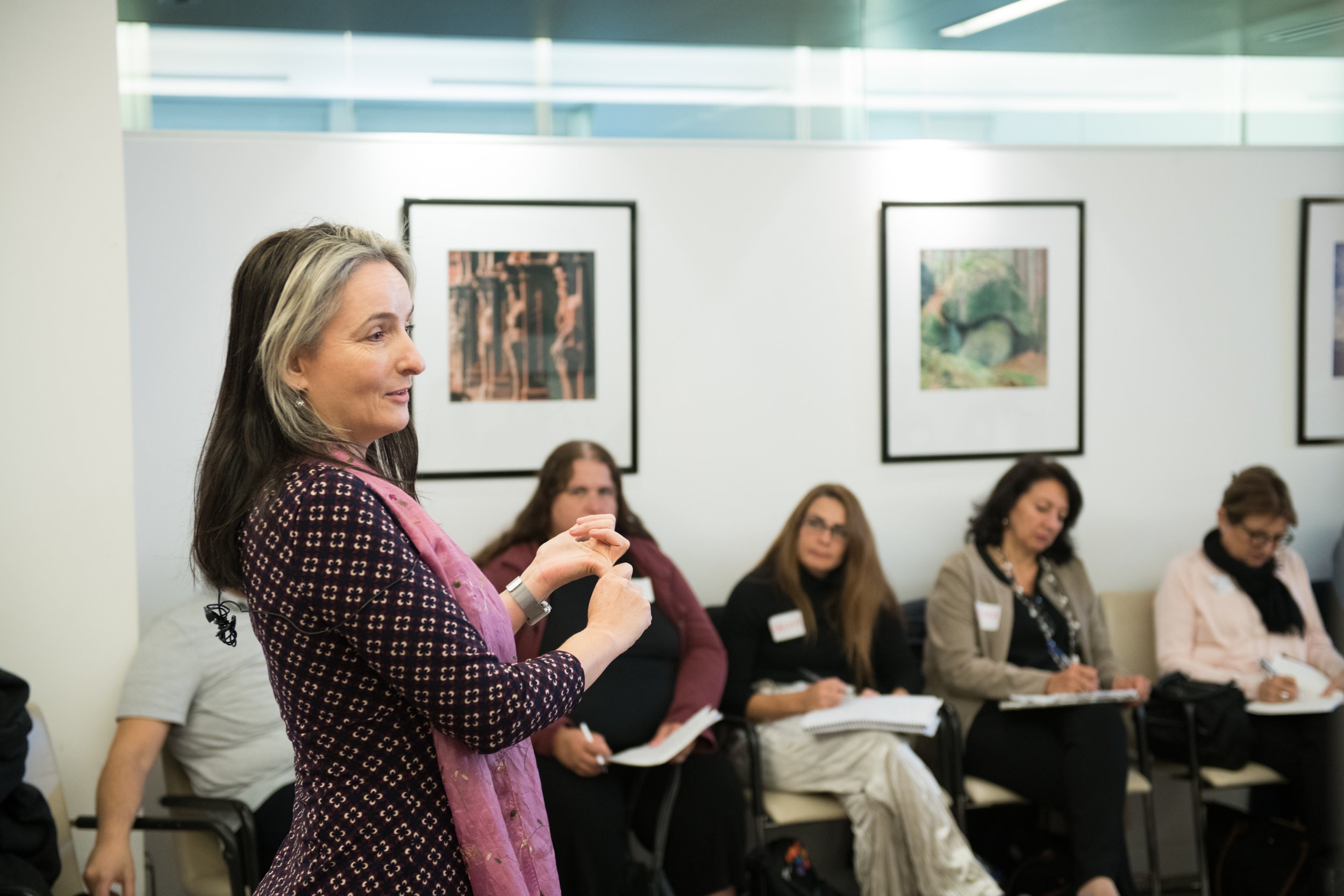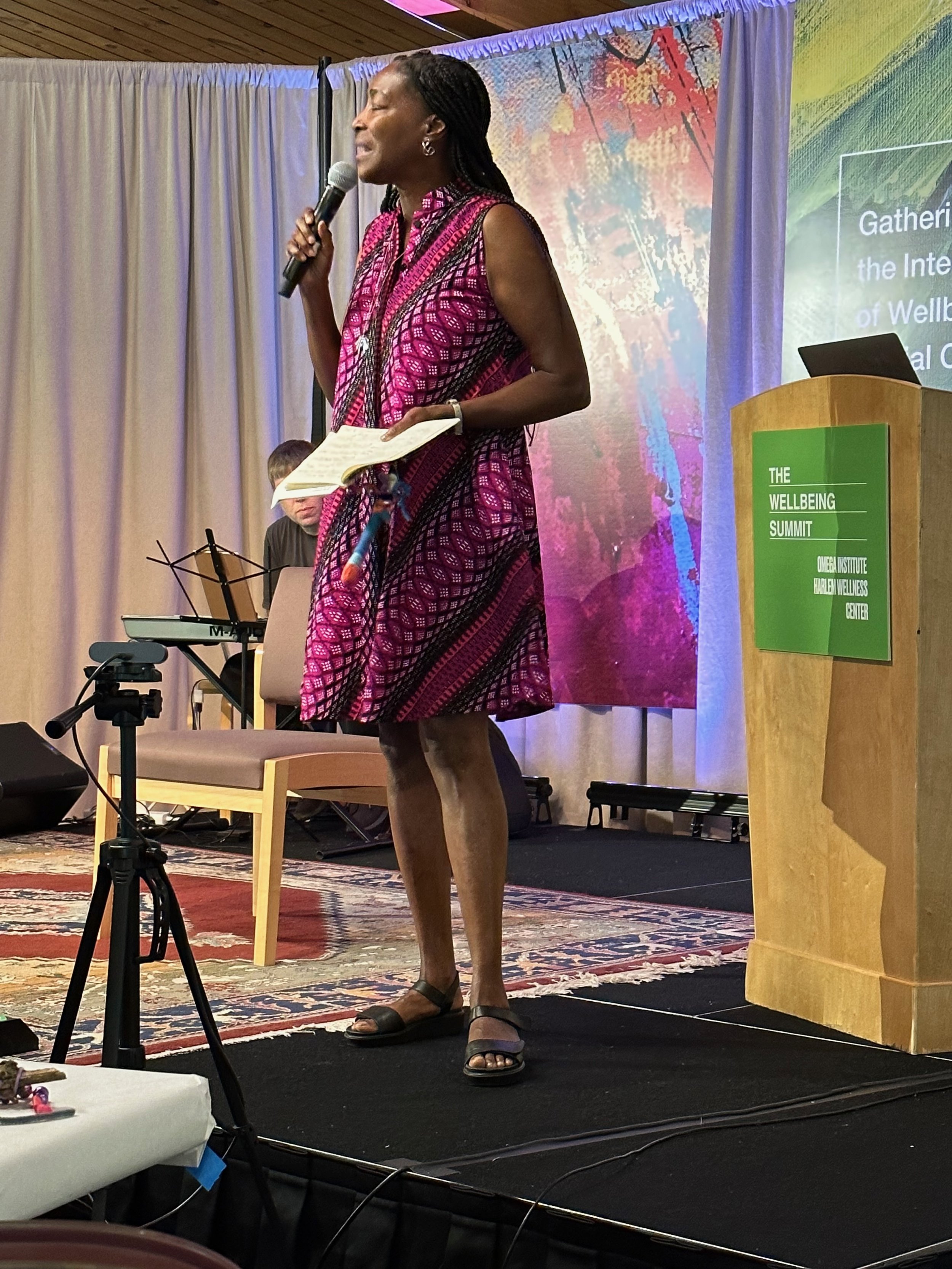
Transform Your Leadership.
IGNITE YOUR IMPACT.
The Women Igniting Leadership Institute provides an intimate, curated learning journey for exceptional women leaders who are ready to transform their leadership capacity while building a powerful community of peers.
Whether you're leading a scientific breakthrough, driving government innovation, scaling your organization, or navigating complex organizational change…
Women Igniting Leadership Institute will equip you with the leadership skills and mindsets needed for you to succeed boldly, bravely, and with grace - while building a powerful community.
Spark Change
More than a retreat. More than a webinar. WILL is a leadership lab.
We provide immersive, practice-driven learning spaces grounded in adaptive leadership research and powered by the lived wisdom of women leaders across sectors. What we teach is grounded in frameworks and embodied to transform the way you show up in moments that matter.
You’ll build capacity in:
Leading
with influence and trust
Navigating
uncertainty with confidence
Energizing
teams and resolving conflict
Cultivating
presence and emotional steadiness
Maintaining
strategic clarity under pressure
Your Path to Stronger Leadership Starts Here
OUR PROGRAMS
The Lab
An immersive 9-month journey designed to help women develop the self-awareness, strategic thinking, and embodied presence needed to thrive in high-stakes leadership.
Executive Coaching
One-on-one and group coaching experiences to support growth during pivotal career moments. Personalized insight, practical tools, and space to reflect and lead with clarity.
Skills Development Workshops
Targeted learning opportunities to strengthen core competencies like negotiation, decision-making, and leading change - designed for real-world leadership challenges.
Weekend Retreats for Alumni
Designed for reflection and renewal, our immersive weekend retreats offer space to reconnect with your purpose and peers in a setting that fosters meaningful growth.
Mitzi Johnson, Speaker of Vermont Legislature & Kirsti Samuels, Associate Professor, Columbia University
Because Its Time to Lead On Your Terms
WHY WOMEN CHOOSE WILL
Many women join Women Igniting Leadership because they’re ready to lead differently – more effectively, more intentionally, and with more support. Whether you're newly stepping into a senior role or managing the complexity of a growing team, our programs are designed to help you strengthen your presence, clarify your strategy, and lead with purpose. You’ll join a learning community that values honesty, growth, and collaboration.
Our vision is a world where more women are leading in senior roles – and doing it in ways that reflect their values, strength, and intelligence.
Leadership, Transformed - In Their Own Words
TESTIMONIALS
“I think the tools provided here help approach leadership in a more objective way. I’ve usually thought of leadership as something very subjective – how you respond to situations felt personal and instinctive. But these tools gave me a different lens. As engineers and people in tech, the more objective something is, the more effectively and consistently we can apply it. So going forward, I think this will help me think through scenarios I used to navigate purely by gut feel—now there’s a framework for how to think about the problem and how to approach it.”
– Director of Computational Engineering
“The program helped me realize where I am, what the pain points were. What I am doing, not doing. That was huge. The program is a testament to the power of reflecting with like-minded women. Felt lighter at the end.”
– Senior Leader, IFC/World Bank, and Co-founder of Cambodia’s Women’s Entrepreneurs Association
“10/10 WONDERFUL to be in a structured community – Wonderful, Wonderful.”
– Co-founder & CEO, Civic Tech Executive
“I realized I was not reaching out for help on the things that matter to me. My coping mechanisms were to figure it out myself. That was NEVER going to work!”
– Senior Executive Advisor in Political Strategy and Social Impact Sectors
“What this program helped me realize is that leadership isn’t about having all the answers. It’s about creating the conditions for people to grow into something new—even when it’s uncomfortable, even when you’re still learning yourself. I didn’t know how to operate the new equipment at first, either. People thought I had it all figured out, but I was learning alongside them. And that vulnerability—being in it together—was part of what made the shift possible.”
– Senior Director of Drug Discovery, Pharmaceutical Company
“I think I started with the assumption that leadership is an inherent thing — that there are good leaders and bad leaders, and you can’t really build it in, at least not completely. A lot of it feels internal, like you’re born with it. But going through the way this course splits the various aspects of leadership — how you interact with people, what they perceive, how you react to their perception or how they see your reaction — it’s opened my eyes to looking at things in a more holistic and analytical way.”
– Senior Physician-Scientist and Organizational Leader in Biomedical Research
“The cohort you’re in and the support system you build here will definitely help me tackle bigger challenges more effectively. One of the biggest takeaways for me was forming relationships with people I wouldn’t normally connect with – and getting to know their struggles. Kirsti and team were great at drawing out things we don’t usually talk about at work. I ended up sharing how my parents didn’t go to college, and the tension between their expectations and mine. I never thought I’d talk about that with colleagues – but that was a powerful part of this experience.”
– C-Suite, Diversity, Equity, and Inclusion Executive
“When you're in an environment that’s always hectic or crashing, you start to think that’s normal. But on our first day, the faculty talked about stepping off the dance floor and going to the balcony to get perspective – and that really stuck with me. We often feel like we don’t have time to pause, because we think we have to stay in it to fix it. But leadership isn’t easy. We’ve all worked incredibly hard to get where we are, and then you realize – there are still skills you need. As high achievers, we’re used to doing it alone. That’s how we got here. But sometimes, having people who truly understand the complexity of leadership in demanding organizations—and being able to talk with them—can be incredibly cathartic.”
– CEO & Nonprofit Executive
“I think the tools provided here help approach leadership in a more objective way. I’ve usually thought of leadership as something very subjective - how you respond to situations felt personal and instinctive. But these tools gave me a different lens. As engineers and people in tech, the more objective something is, the more effectively and consistently we can apply it. So going forward, I think this will help me think through scenarios I used to navigate purely by gut feel—now there’s a framework for how to think about the problem and how to approach it.”
– Director of Computational Engineering
“In my cohort, we’ve decided to keep meeting – and we agreed that anytime one of us is facing a challenge, they can raise a flare. Then we’ll assemble a small team to work through it together, just like we did here. I think that’s a great idea.”
– Chief Medical Officer
“I feel like I’m constantly reacting – trying to fix problems and clean up the mess. I really want to be more proactive, to go to the balcony more often and think things through. But I’m so often in crisis mode that I honestly don’t know how to make time to pause before reacting. This course has been a practice for that. It’s a good reminder to just take a breath. Because if you don’t, you’ll run yourself into the ground. After this program, I may need to change my mantra from ‘If you slow down, they can catch up’ to the Latin phrase, *festina lente*—hurry up slowly.”
– Senior Administrator in Academic Leadership & Operations
“What this program helped me realize is that leadership isn’t about having all the answers. It’s about creating the conditions for people to grow into something new—even when it’s uncomfortable, even when you’re still learning yourself. I didn’t know how to operate the new equipment at first, either. People thought I had it all figured out, but I was learning alongside them. And that vulnerability—being in it together—was part of what made the shift possible.”
– Senior Director of Drug Discovery, Pharmaceutical Company
“I used to think leadership was something you’re born with. This course showed me it’s something you can learn—analytically, relationally, systemically.”
– Legal Counsel
“I think I started with the assumption that leadership is an inherent thing — that there are good leaders and bad leaders, and you can’t really build it in, at least not completely. A lot of it feels internal, like you’re born with it. But going through the way this course splits the various aspects of leadership — how you interact with people, what they perceive, how you react to their perception or how they see your reaction — it’s opened my eyes to looking at things in a more holistic and analytical way.”
– Legal Counsel
“I had tools for technical problems—but now I finally have a way to face adaptive challenges too.”
– Director of Strategic Planning and Museum Operations
“I think being able to classify things in order to approach them with different tools is very helpful. Knowing what is a technical challenge and what is an adaptive challenge – and then being able to use the tools that we've learned from the team on how to tackle those challenges is new in my toolbox. I am the master of technical challenges, but I didn't have the tools, so to speak, in my mental toolbox to deal with an adaptive challenge. And now, I've learned how to start that process to tackle those challenges.”
– Director of Strategic Planning and Museum Operations
“Leadership means being the broken record—offering steadiness when everything feels shaky.”
– Chief Financial Officer
“There’s no doubt that leadership requires a huge amount
Leadership, Transformed - In Their Own Words
TESTIMONIALS
As someone who came up through the scientific track - PhD, postdoc, Principal Investigator - you don’t get much formal leadership training. Most of it comes from watching your advisors: noticing what they do that you admire, and what you don’t. So having more structure and method has been really valuable. I’ve done a few leadership trainings before, but this one was comprehensive, and I really committed to it. The biggest shift has been realizing that leadership is something everyone can learn. There’s a method, there are materials, there are strategies. It’s not always linear—there will be challenges—but there’s a way through.
Senior Physician-Scientist and Leader in Biomedical Research and Innovation
“I struggled at first with calling myself a leader. I run a small team, and ‘leader’ felt like a big shoe to fill. But through this program—and the conversations we had about the differences between leadership, management, and authority—I’ve come to embrace it. I can wear that label now, and wear it comfortably.
What really struck me, especially in reflecting on culture, is how insidious it can be. When you’ve been in a culture for a while, you stop noticing it. You just absorb it. And that makes leading change even harder, because you have to keep asking yourself: are my behaviors reinforcing the culture we already have, or helping to shape the one we want?
That kind of self-scrutiny is part of the job. Leadership asks: how do you stay empathetic and still hold the line? How do you coach people while pushing against old norms? I used to think culture was what’s on the walls, or the stories we tell. But now I see it’s also in the micro-signals: whether you say hi, how you say it, what you choose to tolerate.”
VP of R&D, Biotech Start-Up
I think I started with the assumption that leadership is an inherent thing — that there are good leaders and bad leaders, and you can’t really build it in, at least not completely. A lot of it feels internal, like you’re born with it. But going through the way this course splits the various aspects of leadership — how you interact with people, what they perceive, how you react to their perception or how they see your reaction — it’s opened my eyes to looking at things in a more holistic and analytical way.
Legal Counsel
The program helped me realize where I am, what the pain points were. What I am doing, not doing, That was huge. The program is a testament to the power of reflecting with like-minded women. Felt lighter at the end.
Senior leader, IFC/World Bank, Co-founder of Cambodia’s Women’s Entrepreneurs Association
“I feel like I’m constantly reacting - trying to fix problems and clean up the mess. I really want to be more proactive, to go to the balcony more often and think things through. But I’m so often in crisis mode that I honestly don’t know how to make time to pause before reacting. This course has been a practice for that. It’s a good reminder to just take a breath. Because if you don’t, you’ll run yourself into the ground. After this program, I may need to change my mantra from “If you slow down, they can catch up” to the Latin phrase, festina lente—hurry up slowly.
Senior Administrator in Academic Leadership & Operations
Over time, I’ve realized that leadership is about creating space for more people to lead. We need broader participation in leadership, and too often it’s easy to default to, ‘Oh, that’s someone else’s job. Peter will solve that. Kathy or Jules will handle it.’ But this program helped me see that it’s actually a place that wants people to step into real authority. So I’ve stopped being shy about saying, ‘Okay, I’ll take that on.’ And so far, no one’s said no.
I think I’ve gained respect for myself in that process - by stepping forward, instead of waiting for permission. I might even ask to chair our board next... we’ll see.
Member of the Senior Executive Leadership Team, Arts & Museum Sector
What this program helped me realize is that leadership isn’t about having all the answers. It’s about creating the conditions for people to grow into something new—even when it’s uncomfortable, even when you’re still learning yourself. I didn’t know how to operate the new equipment at first, either. People thought I had it all figured out, but I was learning alongside them. And that vulnerability—being in it together—was part of what made the shift possible.
Senior Director of Drug Discovery, Pharmaceutical Company
I think being able to classify things in order to approach them with different tools is very helpful. Knowing what is a technical challenge and what is an adaptive challenge - and then being able to use the tools that we've learned from the team on how to tackle those challenges is new in my toolbox. I am the master of technical challenges, but I didn't have the tools, so to speak, in my mental toolbox to deal with an adaptive challenge. And now, I've learned how to start that process to tackle those challenges.
Director of Strategic Planning and Museum Operations
I realized I was not reaching out for help on the things that matter to me. My coping mechanisms were to figure it out myself. That was NEVER going to work!
Senior Advisor in Political strategy & Social Impact Sectors
“There’s no doubt that leadership requires a huge amount of repetition—even in the micro moves. You might think, ‘I’ve already said that, they know this.’ But it doesn’t always land that way. People need things restated, reframed. Sometimes you’re still in the same place as last week, but part of the job is saying, ‘We’re going to get through this.’ Being the broken record is part of leading. Because your role is to hold people in that discipline—to keep them steady. That means offering hope, holding the line, reminding them: we’re okay, we’re still going.
This program really reinforced that. As part of the emotional labor of leadership. It reminded us that people don’t just need strategy—they need steadiness.
And the truth is, we forget. You can feel aligned and hopeful one day, and the next you wake up needing to hear it all over again. It’s easy to lose sight of that—especially when everyone’s more activated, more impatient. It becomes so much easier to misread someone or assume bad intent. That’s why it’s hard to stay grounded. Hard to stay in the work.”
Chief Financial Officer
I think the tools provided here help approach leadership in a more objective way. I’ve usually thought of leadership as something very subjective - how you respond to situations felt personal and instinctive. But these tools gave me a different lens. As engineers and people in tech, the more objective something is, the more effectively and consistently we can apply it. So going forward, I think this will help me think through scenarios I used to navigate purely by gut feel—now there’s a framework for how to think about the problem and how to approach it.
Director of Computational Engineering






